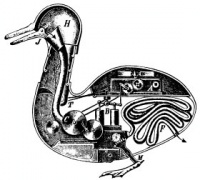Technology
From The Art and Popular Culture Encyclopedia

|
"It is, therefore, worth while to give a short list of some of the things the Greeks and Romans did not know, and that the Middle Ages did know. For most of the examples I shall cite I am indebted to Lynn White’s remarkable essay on Technology and Invention in the Middle Ages."--Prints and Visual Communication (1953) by William Ivins, Jr., page 8 |
_-_Julien_Offray_de_La_Mettrie.jpg)
_-_Julien_Offray_de_La_Mettrie.jpg)
|
Related e |
|
Featured: |
The word technology refers to the making, modification, usage, and knowledge of tools, machines, techniques, crafts, systems, and methods of organization, in order to solve a problem, improve a preexisting solution to a problem, achieve a goal, handle an applied input/output relation or perform a specific function. It can also refer to the collection of such tools, including machinery, modifications, arrangements and procedures. Technologies significantly affect human as well as other animal species' ability to control and adapt to their natural environments. The term can either be applied generally or to specific areas: examples include construction technology, medical technology, and information technology.
The human species' use of technology began with the conversion of natural resources into simple tools. The prehistorical discovery of the ability to control fire increased the available sources of food and the invention of the wheel helped humans in travelling in and controlling their environment. Recent technological developments, including the printing press, the telephone, and the Internet, have lessened physical barriers to communication and allowed humans to interact freely on a global scale. However, not all technology has been used for peaceful purposes; the development of weapons of ever-increasing destructive power has progressed throughout history, from clubs to nuclear weapons.
Technology has affected society and its surroundings in a number of ways. In many societies, technology has helped develop more advanced economies (including today's global economy) and has allowed the rise of a leisure class. Many technological processes produce unwanted by-products, known as pollution, and deplete natural resources, to the detriment of the Earth and its environment. Various implementations of technology influence the values of a society and new technology often raises new ethical questions. Examples include the rise of the notion of efficiency in terms of human productivity, a term originally applied only to machines, and the challenge of traditional norms.
Philosophical debates have arisen over the present and future use of technology in society, with disagreements over whether technology improves the human condition or worsens it. Neo-Luddism, anarcho-primitivism, and similar movements criticise the pervasiveness of technology in the modern world, opining that it harms the environment and alienates people; proponents of ideologies such as transhumanism and techno-progressivism view continued technological progress as beneficial to society and the human condition. Indeed, until recently, it was believed that the development of technology was restricted only to human beings, but recent scientific studies indicate that other primates and certain dolphin communities have developed simple tools and learned to pass their knowledge to other generations.
Contents |
Popular culture
Man's relationship with technology has been explored in science-fiction literature, for example in Brave New World, A Clockwork Orange, Nineteen Eighty-Four, Isaac Asimov's essays, and movies like Minority Report, Total Recall, Gattaca, and Inception. It has spawned the dystopian and futuristic cyberpunk genre, which juxtaposes futuristic technology with societal collapse, dystopia or decay. Notable cyberpunk works include William Gibson's Neuromancer novel, and movies like Blade Runner, and The Matrix.
See also
- Ancient technology
- Critique of technology
- History of science and technology
- Knowledge economy
- Law of the instrument - Golden hammer
- Lewis Mumford
- New media
- Prehistoric technology
- Sabotage
- Technology and society
Theories and concepts in technology
Economics of technology
See also
- Outline of technology
- History of technology
- Philosophy of technology
- Ethics of technology
- Criticism of technology
- Technology and society
- Productivity-improving technologies
- Technological singularity
- Futures studies
Technology journalism




